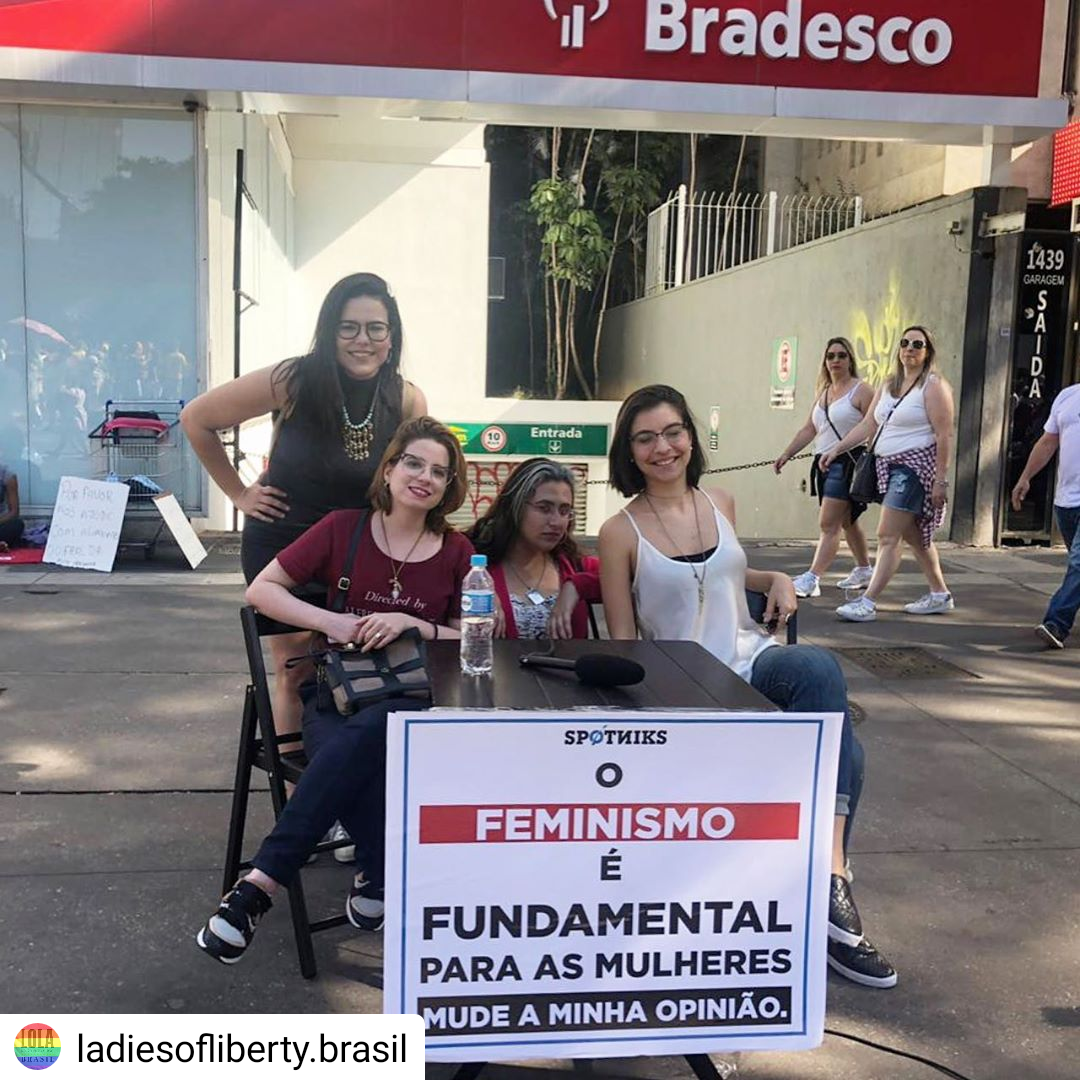Ladies of Liberty Alliance -In the News
Libertarian Feminism
About the article…
On June 30th, 2019, the Ladies of Liberty Alliance chapter in São Paulo, Brazil partnered with a local classically-liberal blog “Spotniks” for a “Change My Mind” style event. During this event, ladies sat at a table with a sign inviting passersby to present an argument to change their beliefs on the importance of libertarian feminism. Many people approached to start a conversation about libertarianism and feminism. As they spoke with passersby, the local media also learned of the event. LOLA Sao Paulo was approached by Folha de S. Paulo, one of the biggest newspapers in Brazil. A journalist visited the chapter and interviewed LOLA Brazil President, Cecilia Lopes, and São Paulo chapter leader, Marina Zonis, about their activism and roles with LOLA.

English Translation:
On June 30, during a demonstration in favor of Minister Sergio Moro (Justice) on Avenida Paulista, a small group on the sidewalk defended the importance of feminism. It seemed crazy: what were those leftists doing in the middle of a right-wing crowd?
[Note: Sergio Moro is Jair Bolsonaro’s minister. He was accused of corruption and some right-wing people protested in São Paulo]
The answer is that it was not a left-wing but [classically] liberal group, LOLA (Ladies of Liberty Alliance). I confess that for me the term “left feminism” has always been a pleonasm. But I was wrong.
“The first feminist in history, the English writer Mary Wollstonecraft [1759-97], was liberal. Only later, with the expansion of socialism, did feminism associate itself with the left “says Cecília Lopes, 20, an economics student at PUC-RJ and president of LOLA in Brazil.
The group emerged in the US in 2009 and today has representations in Latin America, Africa, and Asia. In Brazil, it arrived last year and is still being structured. It has branches in eight states, with about 300 affiliated women. All classical liberals, of course.
For Lopes, using feminism and left as synonyms does not stand up to a brief historical analysis.
“There has always been a lot of chauvinism on the left, with Stalin, Che, and Marx, for example,” she says (in this interview she explained she speaks on a personal basis, not as a group leader).
Reconciling feminism and [classical] liberalism, according to Lopes, is perfectly possible. The objectives are the same, that is, to unite and strengthen (or empower) women. The means is that they are very different.
An example is one of the most important flags for feminists, the wage parity between men and women. Instead of defending laws that correct this distortion, they suggest fewer interventionist ways. “It’s not a pen that will solve,” she says.

LOLA São Paulo members invite passersby to change their beliefs on the importance of libertarian feminism.
Most importantly, for LOLAs, is investing in education for girls.
“Men, in general, go to areas of expertise and women, to those jobs of human beings, who pay less. This comes from an unequal education: dolls for girls, build toys for boys. We must invest in equal education,” she says.
Another liberal measure: institute parental leave divided between father and mother. “Employers tend to negotiate smaller wages for women of childbearing age. With the license split, that would be softened,”, she says.
LOLA, says its president, is a plural entity and accepts even non-feminist women.
For her, leftist feminism is lost on secondary issues, such as the discussion of “man-tenrupting” (when men interrupt women’s speech).
“Talking about keep-breaking is not the most important. The most important thing is the lack of freedom if the woman lives under the command of a husband if she can not marry and work the way she wants,” she says.
In practical terms, LOLA promotes classes of female self-defense, personal finance courses, and oratory, as well as groups of studies of classically liberal readings.
In São Paulo, explains the state coordinator of the group, lawyer Marina Zonis, 25, there is a big focus on the issue of employment. “Women talk a lot about the difficulty of getting or keeping a job after having children,” she says.
To try to help, LOLA does workshops for curriculum development and gives guidance on how to act in job interviews.
Zonis defines himself as a classical liberal. To explain her convictions, she likes to use the image that she advocates for “a state that does not put chairs in front of a person who wants to walk.”
Her first feminist experience, she says, was left-wing, as is often the case. But that did not satisfy their yearnings.
“If you want someone who defends women’s rights, you have no choice, you have to vote for PSO [a left-wing progressive party from Brazil]. But I do not identify with any other part of the PSOL agenda. That’s the problem ” she says. LOLA, she says, has come to try to offer an alternative (although it is a nonpartisan entity).
For now, one of the group’s greatest difficulties is to conquer a niche among feminists and deal with virtual bullying, especially on their Facebook page. As summarized by Zonis:
“We are hated by the left for the right. [They say] we are an organization that should not exist. But we want to show that [classically] liberal women exist.
Thanks to your generous support, we are able to empower Ladies of Liberty in 16 countries and counting! From all of us at the Ladies of Liberty Alliance, thank you!


